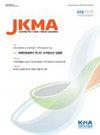Multidrug-resistant bacteria: a national challenge requiring urgent addressal
IF 0.5
Q3 MEDICINE, GENERAL & INTERNAL
引用次数: 0
Abstract
Background: Multidrug-resistant bacterial infections are a worldwide threat owing to their increased prevalence, and poor prognosis due to inadequate antibacterial drugs.Current Concepts: Until 2019, several new antibacterial agents, targeting gram-positive bacteria—including telavancin, oritavancin, dalbavancin, ceftaroline, lefamulin, and delafloxacin—had been approved for use in the United States and Europe. Newer antibiotics targeting gram-negative bacteria include ceftazidime-avibactam, imipenem-cilastatin-relebactam, meropenem-vaborbactam, cefiderocol, eravacycline, and plazomicin. The guidance on the treatment of multidrug-resistant bacteria by the Infectious Diseases Society of America, published in February 2022, recommend the use of new antibacterial agents recently approved. However these drugs have not yet been introduced in Korea, thus impeding their prescription by physicians. Multidrug-resistant bacterial infections demonstrably contribute to a high mortality rate and socioeconomic burden.Discussion and Conclusion: Considering the societal impact of antibiotic resistance, the government should monitor and encourage antimicrobial stewardship to reduce the prevalence of multidrug-resistant bacteria, and hasten the introduction of new antibacterial agents for treating multidrug-resistant bacterial infections in Korea.耐多药细菌:需要紧急处理的国家挑战
背景:耐多药细菌感染是一种全球性的威胁,由于其发病率增加,以及由于抗菌药物不足导致的预后不良。当前概念:直到2019年,几种针对革兰氏阳性细菌的新型抗菌剂——包括特拉万星、奥利塔万星、达尔巴万星、头孢他林、利福霉素和德拉沙星——已被批准在美国和欧洲使用。针对革兰氏阴性菌的新型抗生素包括头孢他啶-阿维巴坦、亚胺培南-西司他汀-勒巴坦、美罗培尼-瓦波巴坦、头孢地罗、依瓦环素和plazomicin。美国传染病学会(Infectious Diseases Society of America)于2022年2月发布的关于治疗耐多药细菌的指南建议使用最近批准的新型抗菌剂。但是,这些药物还没有进入国内市场,因此医生们的处方非常困难。耐多药细菌感染明显造成高死亡率和社会经济负担。讨论与结论:考虑到抗生素耐药性的社会影响,政府应监督和鼓励抗菌药物管理,以减少多药耐药细菌的流行,并加快引进新的抗菌药物来治疗韩国的多药耐药细菌感染。
本文章由计算机程序翻译,如有差异,请以英文原文为准。
求助全文
约1分钟内获得全文
求助全文
来源期刊

Journal of The Korean Medical Association
Medicine-General Medicine
CiteScore
0.50
自引率
0.00%
发文量
84
审稿时长
4-8 weeks
期刊介绍:
The Journal of the Korean Medical Association (JKMA) is the official peer-reviewed, open-access, monthly journal of the Korean Medical Association (KMA). It contains articles in Korean or English. Its abbreviated title is ''J Korean Med Assoc''. The aims of the Journal include contributing to the treatment of and preventing diseases of public health importance and to improvement of health and quality of life through sharing the state-of the-art scientific information on medicine by the members of KMA and other national and international societies.
 求助内容:
求助内容: 应助结果提醒方式:
应助结果提醒方式:


